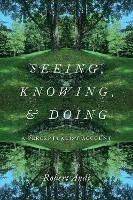Seeing, Knowing, and Doing: A Perceptualist AccountAuthor :
Hardback
Published : Wednesday 15 April 2020
You may also like ...

by
Hardback
15 Apr 2020
>>
€49.14
Extended stock – Dispatch 5-7 days
Description
This book provides an overall theory of perception and much of a theory of knowledge. It explains how we can have justified beliefs and knowledge concerning the physical world, the abstract realm, and the normative domain of right and wrong.
Perception is basic for human knowledge and a major concern of both epistemology and the philosophy of mind. The scholarship in this area, however, has left two important aspects of perception underexplored: its relevance to understanding a priori knowledge-traditionally conceived as independent of perception-and its role in human action. This book provides a full-scale account of perception, a theory of the a priori, and an account of how perception guides action. In exploring perception and action, it clarifies the relation between action and practical reasoning, the notion of rational action, and the relation between knowledge of the practical (of how things are done) and practical knowledge (knowing how to do things). In the first part of the book, Robert Audi lays out a theory of perception as experiential, representational, and causally connected with its objects. He argues that perception is a discriminative response to its objects; it embodies phenomenally distinctive elements; and it yields rich information that underlies human knowledge. Part Two presents a theory of self-evidence and the a priori. Audi's theory is perceptualist in that it explicates the apprehension of a priori truths by articulating its parallels to perception. The theory also unifies empirical and a priori knowledge by clarifying their reliable causal connections with their objects-connections many have thought impossible for a priori knowledge. The final part explores how perception guides action, the role of propositional knowledge in our abilities to do what we know how to do, the nature of reasons for action, the role of inference in determining it, and the overall conditions for its rationality. Addressing longstanding questions left unaddressed in the current literature, Audi's comprehensive theory of perception will appeal to scholars and students interested in philosophy of perception, mind, and epistemology.
Reviews